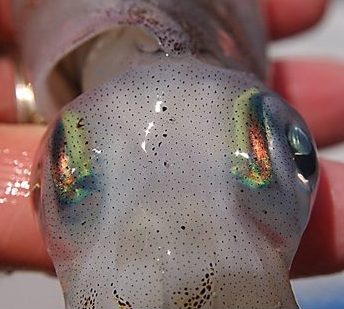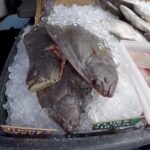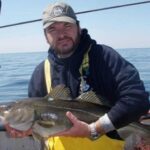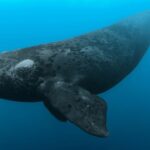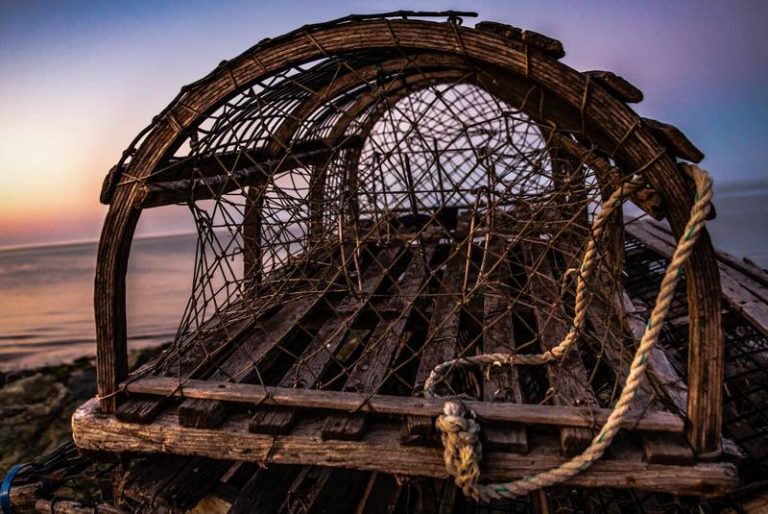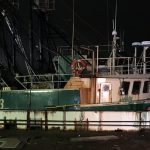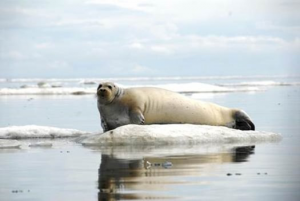Monthly Archives: February 2017
Not Guilty – Judge clears Whitby skipper of sinking boat in harbour
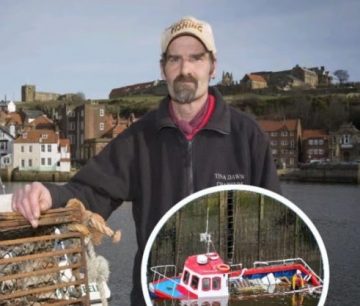 A Whitby skipper accused of sinking a boat in the harbour has spoken of his collapse with tears of relief after the case was dropped. A not guilty verdict has been recorded on Trevor Cross, 49, of Mulgrave Place, Whitby, after the prosecution offered no evidence. Mr Cross, known as Gordon, has spoken to the Whitby Gazette about his ordeal. He said: “It’s a weight lifted off my chest. The night I got the phone call from my barrister telling me the case had been dropped, I just broke down in tears. I was in a pub, went outside and collapsed.” He added: “I maintained my innocence all along – I’m so relieved.” continue reading the story here 11:09
A Whitby skipper accused of sinking a boat in the harbour has spoken of his collapse with tears of relief after the case was dropped. A not guilty verdict has been recorded on Trevor Cross, 49, of Mulgrave Place, Whitby, after the prosecution offered no evidence. Mr Cross, known as Gordon, has spoken to the Whitby Gazette about his ordeal. He said: “It’s a weight lifted off my chest. The night I got the phone call from my barrister telling me the case had been dropped, I just broke down in tears. I was in a pub, went outside and collapsed.” He added: “I maintained my innocence all along – I’m so relieved.” continue reading the story here 11:09
Carteret County board blasts MFC “draconian measures,” in resolution
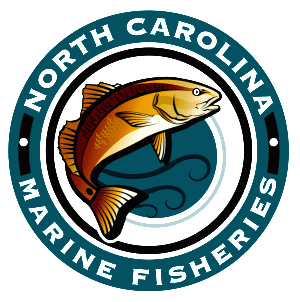 Carteret County will join supporters of the commercial shrimp fishing trade, voicing opposition to the N.C. Marine Fisheries Commission’s decision to pursue tougher restrictions for shrimp trawling, accusing the MFC of putting politics ahead of good management. Commissioners passed a resolution Monday during their February meeting, casting a unanimous vote of “no confidence” on the MFC decision. “There’s some significant economic implications for Carteret County and for all of the tidewater (through granting this petition),” Commissioner Jonathan Robinson said in an impassioned speech in the county boardroom. He accused members of the MFC of politicizing the issue, rather than relying on scientific findings for rulemaking. “When you go in the face and eyes of all your advisers and take that kind of authoritative action, they’ve clearly demonstrated they don’t have the objectivity to make sound decision on this issue,” Mr. Robinson said. continue reading the article here 09:20
Carteret County will join supporters of the commercial shrimp fishing trade, voicing opposition to the N.C. Marine Fisheries Commission’s decision to pursue tougher restrictions for shrimp trawling, accusing the MFC of putting politics ahead of good management. Commissioners passed a resolution Monday during their February meeting, casting a unanimous vote of “no confidence” on the MFC decision. “There’s some significant economic implications for Carteret County and for all of the tidewater (through granting this petition),” Commissioner Jonathan Robinson said in an impassioned speech in the county boardroom. He accused members of the MFC of politicizing the issue, rather than relying on scientific findings for rulemaking. “When you go in the face and eyes of all your advisers and take that kind of authoritative action, they’ve clearly demonstrated they don’t have the objectivity to make sound decision on this issue,” Mr. Robinson said. continue reading the article here 09:20
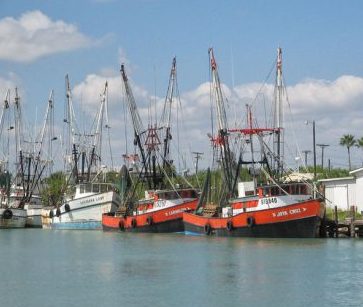
Shrimp industry grant proposed
The Texas Shrimp Association may be in line for a $300,000 grant from the Texas Commission on Environmental Quality, which will distribute a portion of the billions of dollars in RESTORE Act money generated by fines paid out by BP stemming from the Deepwater Horizon oil spill disaster. The proposed grant is included in a draft project list of more than 200 Texas projects totaling $1.1 billion that were submitted for RESTORE Act funds. The list will go into creation of a draft “Multi-Year Implementation Plan,” which eventually will be posted in the Texas Register for a 45-day public comment period before a final MIP is developed. That document then will be submitted to the Treasury Department for final approval. In other words, the grant isn’t a done deal, though TSA Executive Director Andrea Hance is keeping her fingers crossed. TSA would use part of the money for marketing and promotion, part of it for consumer education and tourism — including shrimp tours for Winter Texans — and some of it for social media campaigns that market wild-caught Gulf shrimp directly to consumers as opposed to restaurants, she said. Read the article here 08:53
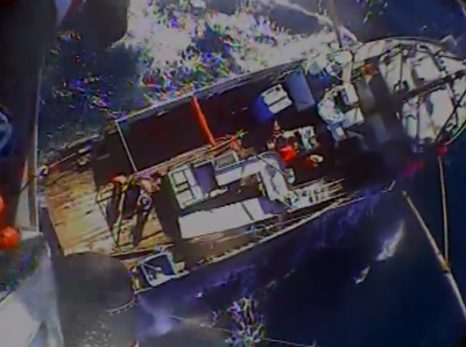
Coast Guard helps dewater, escort troubled fishing vessel off Cape Cod
The Coast Guard is escorting an 83-foot fishing vessel Friday after it started taking on water 50 miles east of Chatham. At about 11:30 a.m., Coast Guard Sector Southeastern New England watchstanders received a radio call from the crew of the Krystle James stating they had six people aboard and were taking on water, reportedly from a hole in the hull. Coast Guard Air Station Cape Cod launched an MH-60 Jayhawk helicopter crew and Station Chatham launched their 42-foot Near Shore Lifeboat boat crew. The helicopter crew arrived on scene first and deployed a dewatering pump to the fishing crew. With the pump able to control the flooding, the aircrew stayed on scene until the 42-foot Near Shore Lifeboat boat crew arrived to escort Krystle James toward land. Coast Guard Cutter Tybee was diverted from an offshore patrol, relieved Station Chatham and is escorting the fishing crew safely to New Bedford. Video 08:04
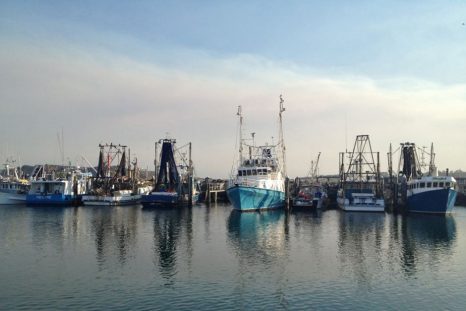
Fishing inquiry calls for more money for adjustment and an urgent assessment of fishing stocks
An inquiry into commercial fishing in New South Wales has recommended the Government find more money to help fishermen adjust to reforms. $16 million dollars has been put aside to help fishermen buy extra shares to stay in the industry, but many have claimed that won’t be enough. Chair of the inquiry Robert Brown said about $20 million might be required. “No fisher, none of these small businesses should be left hanging,” he said. The reforms were aimed at removing a large number of “latent” licences from the industry but Mr Brown said those licences should have been handled differently from active licences held by working fishermen. continue reading the story here 20:21
Photos: Fishermen Catch Large Blue Marlin
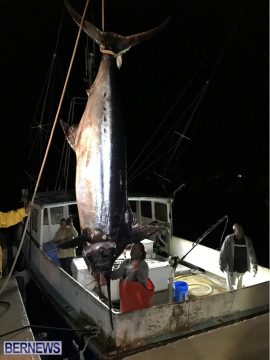 “It’s a total shock!” – That was the reaction from brothers Allan and Delvin Bean when they caught a huge Blue Marlin earlier this week.The Beans were in the boat Nothing’s Easy in between Argus and Challenger Banks when they received a tug on their line. Delvin told Bernews, “We knew we had something special form the beginning because the line was screaming on the 130 reel. We actually had the line out trying to catch a blue fin tuna. This fish just started going and going and going. “My brother was scrambling around trying to control the fish. While he was controlling it, I was trying to bring it in. I’m fighting this fish and it got about 50 yards off the boat and it just took off again. At this time of the year it’s supposed to be a blue fin tuna and not a blue marlin. continue reading the story, and check out the photo’s 18:54
“It’s a total shock!” – That was the reaction from brothers Allan and Delvin Bean when they caught a huge Blue Marlin earlier this week.The Beans were in the boat Nothing’s Easy in between Argus and Challenger Banks when they received a tug on their line. Delvin told Bernews, “We knew we had something special form the beginning because the line was screaming on the 130 reel. We actually had the line out trying to catch a blue fin tuna. This fish just started going and going and going. “My brother was scrambling around trying to control the fish. While he was controlling it, I was trying to bring it in. I’m fighting this fish and it got about 50 yards off the boat and it just took off again. At this time of the year it’s supposed to be a blue fin tuna and not a blue marlin. continue reading the story, and check out the photo’s 18:54
Farmed Salmon on the loose! Storm damages an aquaculture pen at the mouth of Shelburne Harbour
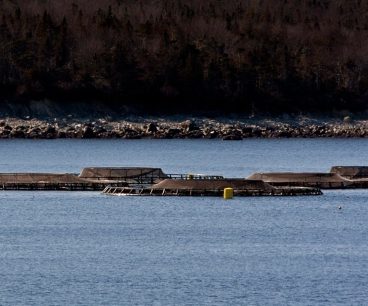 Provincial fisheries inspectors are investigating the escape of possibly hundreds of market-ready salmon from an aquaculture pen at the mouth of Shelburne Harbour. Employees at Cooke Aquaculture noticed a breach in one of the company’s enclosures last Wednesday and notified the province. They discovered some fish had escaped two days later, said Krista Higdon, a spokeswoman for the Nova Scotia Department of Fisheries and Aquaculture. Cooke spokeswoman Nell Halse said it appeared wind and waves associated with recent winter storms knocked over one of the moorings and that created a breach in one of the enclosures. She said the company was still trying to determine how many fish might have slipped free. continue reading here 17:34
Provincial fisheries inspectors are investigating the escape of possibly hundreds of market-ready salmon from an aquaculture pen at the mouth of Shelburne Harbour. Employees at Cooke Aquaculture noticed a breach in one of the company’s enclosures last Wednesday and notified the province. They discovered some fish had escaped two days later, said Krista Higdon, a spokeswoman for the Nova Scotia Department of Fisheries and Aquaculture. Cooke spokeswoman Nell Halse said it appeared wind and waves associated with recent winter storms knocked over one of the moorings and that created a breach in one of the enclosures. She said the company was still trying to determine how many fish might have slipped free. continue reading here 17:34
US Coast Guard convenes Marine Board of Investigation into loss of F/V Destination
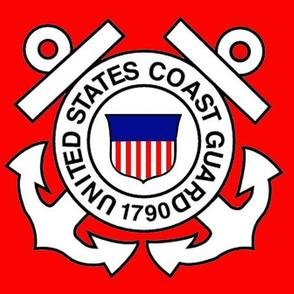 WASHINGTON- The U.S. Coast Guard has convened a Marine Board of Investigation into the loss of F/V Destination and its six crewmembers. A Marine Board of Investigation is the highest level of investigation in the Coast Guard. Upon completion of the investigation, the Board will issue a report to the commandant with the evidence collected, the facts established and its conclusions and recommendations. During the course of the MBI, panel members must decide: The factors that contributed to the accident, Whether there is evidence that any act of misconduct, inattention to duty, negligence or willful violation of the law on the part of any licensed or certificated person contributed to the casualty. Whether there is evidence that any Coast Guard personnel or any representative or employee of any other government agency or any other person caused or contributed to the casualty National Transportation Safety Board is participating alongside the Coast Guard in its investigation, but will produce an independent report with its own findings. Link 15:45
WASHINGTON- The U.S. Coast Guard has convened a Marine Board of Investigation into the loss of F/V Destination and its six crewmembers. A Marine Board of Investigation is the highest level of investigation in the Coast Guard. Upon completion of the investigation, the Board will issue a report to the commandant with the evidence collected, the facts established and its conclusions and recommendations. During the course of the MBI, panel members must decide: The factors that contributed to the accident, Whether there is evidence that any act of misconduct, inattention to duty, negligence or willful violation of the law on the part of any licensed or certificated person contributed to the casualty. Whether there is evidence that any Coast Guard personnel or any representative or employee of any other government agency or any other person caused or contributed to the casualty National Transportation Safety Board is participating alongside the Coast Guard in its investigation, but will produce an independent report with its own findings. Link 15:45
March 1 is Tax Deadline for some Farmers and Fishermen
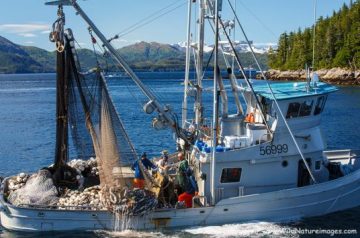 Most Americans think of April 15 as the tax deadline, but for many farmers and fishermen, there’s another deadline and it’s almost here. Wednesday, March 1 is the 2017 deadline for taxpayers with income from farming and fishing to file their 2016 Form 1040 and pay the tax due to avoid making estimated tax payments. This rule generally applies if farming or fishing income was at least two-thirds of the total gross income in either the current or the preceding tax year. Since 2014, IRS Direct Pay has offered individual taxpayers an easy way to quickly pay the tax amount due or make quarterly estimated tax payments directly from checking or savings accounts without any fees or pre-registration. Continue reading the rest here with external links 13:55
Most Americans think of April 15 as the tax deadline, but for many farmers and fishermen, there’s another deadline and it’s almost here. Wednesday, March 1 is the 2017 deadline for taxpayers with income from farming and fishing to file their 2016 Form 1040 and pay the tax due to avoid making estimated tax payments. This rule generally applies if farming or fishing income was at least two-thirds of the total gross income in either the current or the preceding tax year. Since 2014, IRS Direct Pay has offered individual taxpayers an easy way to quickly pay the tax amount due or make quarterly estimated tax payments directly from checking or savings accounts without any fees or pre-registration. Continue reading the rest here with external links 13:55

Candied salmon ice cream, kelp salsa & halibut bisque baby food: Seafood contest shows off the new and unusual
In any supermarket, you’ll find dozens of pork, beef and chicken products. Not so for salmon. When it comes to sockeye, king or coho, U.S. consumers are largely limited to raw product and pre-cooked, breaded fish sticks. That’s a problem for the seafood industry, said Alaska Fisheries Development Foundation Julie Decker, co-host of Wednesday’s Symphony of Seafood new product competition at Centennial Hall. If Alaska wants to increase the value of its seafood industry, Decker said, it will have to take chances on locally-produced, shelf-ready goods like the kelp salsa, baby food and salmon leather wallets on display at the symphony. The AFDF has been putting on the symphony for 24 years now in an attempt to diversify the industry. Product development is key to helping the industry adapt to international competition. Continue reading the article here 13:20
Clam Boats Test Paperless Reporting – eClams (Electronic Clam Logbook and Account Management Software)
 NEFSC cooperative research and data management staff are offering to install equipment on commercial fishing vessels for electronic trip reporting in the surfclam and ocean quahog fisheries. So far, 35 vessels from New Bedford, MA to Atlantic City, NJ have been outfitted to voluntarily test the system, and more than 700 e-trip reports have been transmitted. Called eClams (Electronic Clam Logbook and Account Management Software), the system allows fishermen to electronically record all the information required on the paper-based fishing trip report. These data are transmitted to NOAA Fisheries after the trip using land-based communication services such as WiFi. Read the rest here 11:28
NEFSC cooperative research and data management staff are offering to install equipment on commercial fishing vessels for electronic trip reporting in the surfclam and ocean quahog fisheries. So far, 35 vessels from New Bedford, MA to Atlantic City, NJ have been outfitted to voluntarily test the system, and more than 700 e-trip reports have been transmitted. Called eClams (Electronic Clam Logbook and Account Management Software), the system allows fishermen to electronically record all the information required on the paper-based fishing trip report. These data are transmitted to NOAA Fisheries after the trip using land-based communication services such as WiFi. Read the rest here 11:28
Louisiana: Des Allemands crab fisherman says state closure is unfair
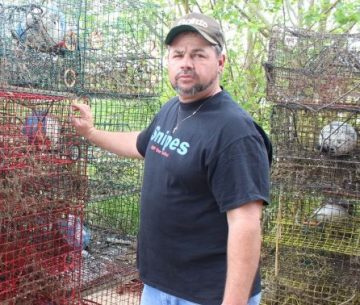 With a fast flick of his hand, Whitney Curole sent a large blue crab sailing into a white plastic basket as he sorted the last of the prized crustaceans at his Des Allemands dock operation. The crab flipped itself upright and extended its open claws in attack mode for a fight it obviously didn’t win. But Curole said he opposes the politics that he maintained are hurting his business as a commercial fisherman. Curole continued sorting the catch just in from a Houma crabber, delivered shortly before the Louisiana Wildlife and Fisheries Commission (LWFC) closed the season on Monday (Feb. 20) for 30 days. The move also came with a year round ban on harvesting immature female crabs for commercial sale. Curole and LWFC agree crab numbers are down, but they disagree on why. Reaching into a box full of crabs, he withdrew several crabs with numerous missing legs. “These legs were eaten by fish,” Curole said displaying a crab with all its legs gone. “You leave them overnight in the traps and it will be full of them.” Read the article here 09:50
With a fast flick of his hand, Whitney Curole sent a large blue crab sailing into a white plastic basket as he sorted the last of the prized crustaceans at his Des Allemands dock operation. The crab flipped itself upright and extended its open claws in attack mode for a fight it obviously didn’t win. But Curole said he opposes the politics that he maintained are hurting his business as a commercial fisherman. Curole continued sorting the catch just in from a Houma crabber, delivered shortly before the Louisiana Wildlife and Fisheries Commission (LWFC) closed the season on Monday (Feb. 20) for 30 days. The move also came with a year round ban on harvesting immature female crabs for commercial sale. Curole and LWFC agree crab numbers are down, but they disagree on why. Reaching into a box full of crabs, he withdrew several crabs with numerous missing legs. “These legs were eaten by fish,” Curole said displaying a crab with all its legs gone. “You leave them overnight in the traps and it will be full of them.” Read the article here 09:50
TowBoatUS captains honored for saving lives
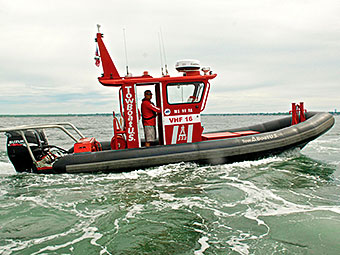 Ten TowBoatUS captains were honored by their peers for lifesaving actions at the annual BoatUS Towing Conference last week in San Diego. The captains serve TowBoatUS locations in Florida, Massachusetts, New Jersey, Rhode Island and North Carolina. The awards were given at the Feb.14-16 conference for actions they took last year. Meritorious Service Awards were given to eight recipients, including Capt. Clint Allen, TowBoatUS New Bedford, Mass.: rescued six crewmen from the 72-foot commercial scallop fishing vessel Captain Jeff after it began taking on water five miles south of New Bedford Harbor. Read the story here 08:53
Ten TowBoatUS captains were honored by their peers for lifesaving actions at the annual BoatUS Towing Conference last week in San Diego. The captains serve TowBoatUS locations in Florida, Massachusetts, New Jersey, Rhode Island and North Carolina. The awards were given at the Feb.14-16 conference for actions they took last year. Meritorious Service Awards were given to eight recipients, including Capt. Clint Allen, TowBoatUS New Bedford, Mass.: rescued six crewmen from the 72-foot commercial scallop fishing vessel Captain Jeff after it began taking on water five miles south of New Bedford Harbor. Read the story here 08:53
N.J. Reps LoBiondo and Pallone talk tough, announce legislation to prevent absurd summer flounder quotas
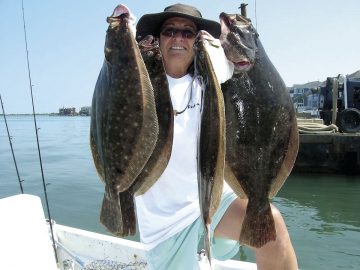 Reps. Frank LoBiondo and Frank Pallone on Thursday, Feb. 23 announced plans to introduce new legislation to prevent the National Oceanic and Atmospheric Administration 2017 and 2018 summer flounder quotas for recreational and commercial fishing from going into effect. In a press release, Pallone and LoBiondo said the rules would do damage to the economies of coastal communities and the state. Under the NOAA quotas, the allowed summer flounder catch for recreational and commercial fishing were both reduced by approximately 30 percent in 2017 and 16 percent in 2018. The Pallone-LoBiondo legislation would maintain the 2016 quota levels and require that NOAA conduct a new assessment before issuing new quotas. Continue reading the story here 07:31
Reps. Frank LoBiondo and Frank Pallone on Thursday, Feb. 23 announced plans to introduce new legislation to prevent the National Oceanic and Atmospheric Administration 2017 and 2018 summer flounder quotas for recreational and commercial fishing from going into effect. In a press release, Pallone and LoBiondo said the rules would do damage to the economies of coastal communities and the state. Under the NOAA quotas, the allowed summer flounder catch for recreational and commercial fishing were both reduced by approximately 30 percent in 2017 and 16 percent in 2018. The Pallone-LoBiondo legislation would maintain the 2016 quota levels and require that NOAA conduct a new assessment before issuing new quotas. Continue reading the story here 07:31
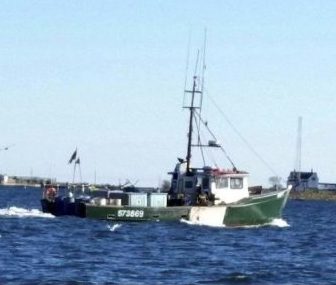
Bad hull, flooding led to fatal sinking of Orin C
The deadly sinking of the Gloucester-ported Orin C nearly 15 months ago probably was caused by structural problems with the vessel’s wooden hull and subsequent flooding, according to reports from the National Transportation Safety Board and Coast Guard released Thursday. The two reports detailed the marine tragedy that resulted in the drowning of 47-year-old Capt. David C. “Heavy D” Sutherland during the final stages of the Coast Guard’s rescue that saved crewmembers Rick Palmer and Travis Lane on the night of Dec. 3, 2015. Neither Palmer nor Lane could be reached Thursday for comment. The Coast Guard report did not recommend any changes to its training, rescue procedures or the equipping of its rescue vessels. That, however, does not mean it won’t make changes in the future, according to District 1 Deputy Commander Brad Kelly. “That is something the Coast Guard is always looking at in trying to determine what should be included into all of our rescue platforms,” Kelly said. “That is an ongoing process.” Continue reading the article here 21:01
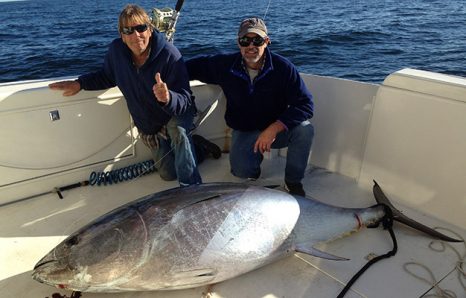
A veteran commercial fisherman’s invite to fish for giants came along and I wasted no time in accepting.
Catching a giant bluefin with rod and reel has been on my bucket list for a long time. I grew up on the water and spent several summers as part of a crew that fished with handline or harpoon. My life’s path led me away from the ocean, and for years I’d wanted to go back and do it again with more sporting tackle. Decades passed without an opportunity and my desire was relegated to the back burner until a recent series of events rekindled the flame. Several more years passed as I tried unsuccessfully to mooch my way onto a boat until I eventually connected with fellow Mainer, Don Fletcher. A veteran commercial fisherman, Don switched over to tuna fishing after he acquired an Ocean Yachts 55 SS he named the Blue Bandit. When the invitation came to join him, I wasted no time in accepting. Continue reading the story here 16:52
Hawaii bill would ban licenses for some foreign fishermen
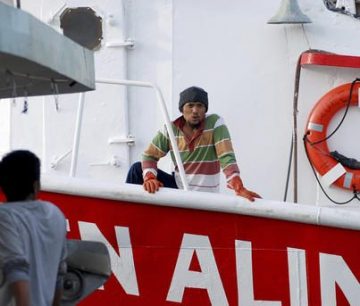 A bill in the Hawaii Legislature aims to change rules for how fishing licenses are issued to foreign crew members that make up the majority of the state’s commercial fleet. Now, boat owners or captains bring foreign crew members’ passports and customs documents to a state agency to get their licenses – without the fishermen present. A federal legal loophole allows foreign fishermen to work off the coast of Hawaii, but they are technically not allowed to enter the country. The bill would require anyone seeking a commercial fishing license in Hawaii to appear in person. State Sen. Karl Rhoads says he wants to change the law so people who are not permitted to enter the U.S. cannot get a license to fish on American-flagged boats sailing from Honolulu. The Hawaii Longline Association opposed the bill, saying the industry is already regulated and additional requirements are unnecessary. Read the story here 16:00
A bill in the Hawaii Legislature aims to change rules for how fishing licenses are issued to foreign crew members that make up the majority of the state’s commercial fleet. Now, boat owners or captains bring foreign crew members’ passports and customs documents to a state agency to get their licenses – without the fishermen present. A federal legal loophole allows foreign fishermen to work off the coast of Hawaii, but they are technically not allowed to enter the country. The bill would require anyone seeking a commercial fishing license in Hawaii to appear in person. State Sen. Karl Rhoads says he wants to change the law so people who are not permitted to enter the U.S. cannot get a license to fish on American-flagged boats sailing from Honolulu. The Hawaii Longline Association opposed the bill, saying the industry is already regulated and additional requirements are unnecessary. Read the story here 16:00
Fishermen at odds over impact of Trump executive order
 An executive order by President Donald Trump designed to radically cut back on federal regulations has spurred disagreement among fishermen about how it will affect them — and lawmakers and regulators aren’t sure what the answer is. Groups that represent both commercial and recreational fishermen are divided over whether Trump’s “one in, two out” approach to federal regulations will benefit their industry, harm it or not affect it at all.,, Several fishing groups, ranging from the Alaska Longline Fishermen’s Association to the Massachusetts Striped Bass Association, are joining Democratic Reps. Jared Huffman of California and Raul Grijalva of Arizona in asking Trump to rescind.,, Other industry interests, including the Fisheries Survival Fund, said the order will likely leave fisheries unaffected. The order would apply only to financially significant regulations, and that would not include things like opening fishing seasons and enforcing catch limits, said Drew Minkiewicz, an attorney for the fund. “All this talk about how you’re not going to be able to manage fisheries — not true, doesn’t apply, not going to happen,” he said. Read the full story here 15:04
An executive order by President Donald Trump designed to radically cut back on federal regulations has spurred disagreement among fishermen about how it will affect them — and lawmakers and regulators aren’t sure what the answer is. Groups that represent both commercial and recreational fishermen are divided over whether Trump’s “one in, two out” approach to federal regulations will benefit their industry, harm it or not affect it at all.,, Several fishing groups, ranging from the Alaska Longline Fishermen’s Association to the Massachusetts Striped Bass Association, are joining Democratic Reps. Jared Huffman of California and Raul Grijalva of Arizona in asking Trump to rescind.,, Other industry interests, including the Fisheries Survival Fund, said the order will likely leave fisheries unaffected. The order would apply only to financially significant regulations, and that would not include things like opening fishing seasons and enforcing catch limits, said Drew Minkiewicz, an attorney for the fund. “All this talk about how you’re not going to be able to manage fisheries — not true, doesn’t apply, not going to happen,” he said. Read the full story here 15:04
NOAA/NMFS Declines to List Thorny Skate as Threatened or Endangered
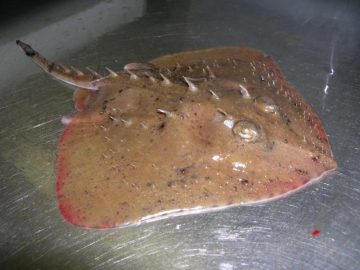 In response to a petition from Defenders of Wildlife and Animal Welfare Institute to list thorny skate (Amblyraja radiata) under the Endangered Species Act, we have now determined that listing is not warranted at this time. The May 2015 petition requested that we list a “Northwest Atlantic Distinct Population Segment” or a “United States Distinct Population Segment” of thorny skate as threatened or endangered. Thorny skate are at low abundance in U.S. waters compared to historical levels, primarily due to overfishing. However, declines have been halted throughout most of the species’ full range, and the species remains abundant throughout the North Atlantic, with hundreds of millions of individuals in the Northwest Atlantic alone. Read the rest here 12:21
In response to a petition from Defenders of Wildlife and Animal Welfare Institute to list thorny skate (Amblyraja radiata) under the Endangered Species Act, we have now determined that listing is not warranted at this time. The May 2015 petition requested that we list a “Northwest Atlantic Distinct Population Segment” or a “United States Distinct Population Segment” of thorny skate as threatened or endangered. Thorny skate are at low abundance in U.S. waters compared to historical levels, primarily due to overfishing. However, declines have been halted throughout most of the species’ full range, and the species remains abundant throughout the North Atlantic, with hundreds of millions of individuals in the Northwest Atlantic alone. Read the rest here 12:21
Maryland’s veteran crab manager fired after watermen complain to Hogan
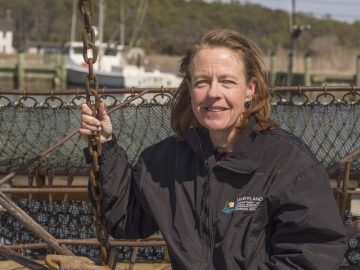 Maryland’s veteran manager of the state’s blue crab fishery was fired this week after a group of watermen complained to Gov. Larry Hogan about a catch regulation that they contend hurts their livelihood — but that scientists say is needed to ensure a sustainable harvest. Brenda Davis, crab program manager for the Department of Natural Resources and a 28-year state employee, said she was informed Tuesday that her services were no longer needed. In an interview Wednesday, Davis said Fisheries Director Dave Blazer gave no reason for her summary dismissal. But it came after Hogan met last week with about a dozen Dorchester County watermen who had been pressing Davis and the DNR for a change in a long-time regulation setting the minimum catchable size for crabs. Continue reading the story here 11:46
Maryland’s veteran manager of the state’s blue crab fishery was fired this week after a group of watermen complained to Gov. Larry Hogan about a catch regulation that they contend hurts their livelihood — but that scientists say is needed to ensure a sustainable harvest. Brenda Davis, crab program manager for the Department of Natural Resources and a 28-year state employee, said she was informed Tuesday that her services were no longer needed. In an interview Wednesday, Davis said Fisheries Director Dave Blazer gave no reason for her summary dismissal. But it came after Hogan met last week with about a dozen Dorchester County watermen who had been pressing Davis and the DNR for a change in a long-time regulation setting the minimum catchable size for crabs. Continue reading the story here 11:46
PETA takes credit for Linda Beans exit from the lobster industry
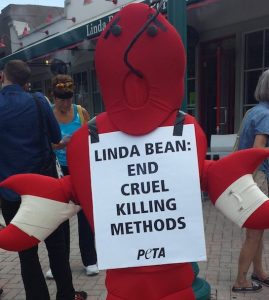 A PETA investigation showed workers at Linda Bean’s Maine Lobster slaughterhouse ripping fully conscious crabs and lobsters apart. After CBS released the footage, it wasn’t long before social media influencers did the same thing to Linda Bean. Faced with the negative attention, canceled business contracts, PETA protests, and a barrage of nearly 76,000 e-mails from our members, Bean began quietly slipping out the back door of the lobster shanty, as reported by The Boston Globe. Read the rest here, and by all means, Order Your FREE Vegan Starter Kit! 11:00
A PETA investigation showed workers at Linda Bean’s Maine Lobster slaughterhouse ripping fully conscious crabs and lobsters apart. After CBS released the footage, it wasn’t long before social media influencers did the same thing to Linda Bean. Faced with the negative attention, canceled business contracts, PETA protests, and a barrage of nearly 76,000 e-mails from our members, Bean began quietly slipping out the back door of the lobster shanty, as reported by The Boston Globe. Read the rest here, and by all means, Order Your FREE Vegan Starter Kit! 11:00
Cook Inlet Alaska Board of Fisheries meeting to kick off with new faces, old grudges
 The Alaska Board of Fisheries has a full plate for its triennial Upper Cook Inlet finfish meeting beginning Feb. 23 and running through March 3 in Anchorage. The board will look quite different with three new members since the last meeting and so does the fishery after three years of restriction, tight markets, lawsuits, and accusations of disregarding the best science that revolve around the board decisions at its last Upper Cook Inlet meeting in 2014. Chinook, or king, salmon stocks on the Kenai River and around the state started to plummet in the late 2000s, and in 2014, the Board of Fisheries approved paired restrictions directing the Alaska Department of Fish and Game had to take certain actions when the Kenai king fishery was restricted, including limiting commercial fishing time. Sport representatives generally thought it fair to share the burden of conservation, while commercial fishermen said it hit them harder than the sportfishermen. This year, nearly 200 proposals from commercial, sport and subsistence fishermen will try to overhaul entire fishery management plans, revise escapement goals, expand or contract fishing areas and openings hours, add or remove new gear types and in general try to open up more fishing opportunity for each respective group. Continue reading the article here 08:54
The Alaska Board of Fisheries has a full plate for its triennial Upper Cook Inlet finfish meeting beginning Feb. 23 and running through March 3 in Anchorage. The board will look quite different with three new members since the last meeting and so does the fishery after three years of restriction, tight markets, lawsuits, and accusations of disregarding the best science that revolve around the board decisions at its last Upper Cook Inlet meeting in 2014. Chinook, or king, salmon stocks on the Kenai River and around the state started to plummet in the late 2000s, and in 2014, the Board of Fisheries approved paired restrictions directing the Alaska Department of Fish and Game had to take certain actions when the Kenai king fishery was restricted, including limiting commercial fishing time. Sport representatives generally thought it fair to share the burden of conservation, while commercial fishermen said it hit them harder than the sportfishermen. This year, nearly 200 proposals from commercial, sport and subsistence fishermen will try to overhaul entire fishery management plans, revise escapement goals, expand or contract fishing areas and openings hours, add or remove new gear types and in general try to open up more fishing opportunity for each respective group. Continue reading the article here 08:54
Sebastian Inlet District to crack down on angry anglers defecating and spreading it on the rail to mark their territory
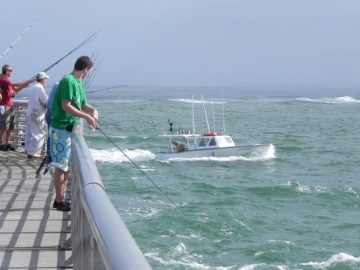 At Sebastian Inlet fishing pier, lines often cross. And tangled tackle ticks off fishermen so much, they often revert to territorial tactics, casting aspersions and sometimes other things at their angling adversaries, inlet officials and fishermen say. They hurl lead fishing weights, lures and other objects at folks fishing from boats. Or sometimes boaters are the primary aggressors. Signs and video cameras haven’t tempered things much. Inlet officials say that in the past few years, the pier atmosphere has degraded into a state of constant territorial marking, as things just keep hitting the fan — and sometimes even the concrete pier and its cylindrical metal rails. “We’ve had reports of people defecating and spreading it on the rail to mark their territory so nobody will fish next to them,” said Martin Smithson, administrator for the Sebastian Inlet District. “There have been several citations for public urination.” Read the story here 08:14
At Sebastian Inlet fishing pier, lines often cross. And tangled tackle ticks off fishermen so much, they often revert to territorial tactics, casting aspersions and sometimes other things at their angling adversaries, inlet officials and fishermen say. They hurl lead fishing weights, lures and other objects at folks fishing from boats. Or sometimes boaters are the primary aggressors. Signs and video cameras haven’t tempered things much. Inlet officials say that in the past few years, the pier atmosphere has degraded into a state of constant territorial marking, as things just keep hitting the fan — and sometimes even the concrete pier and its cylindrical metal rails. “We’ve had reports of people defecating and spreading it on the rail to mark their territory so nobody will fish next to them,” said Martin Smithson, administrator for the Sebastian Inlet District. “There have been several citations for public urination.” Read the story here 08:14
AK seafood earnings, poundage outpaced by Washington state
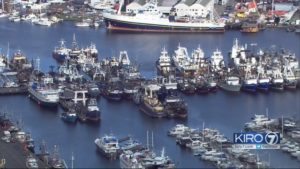 Alaska’s seafood industry puts more people to work than any other private industry, topping 60,000 workers in 2015. Of that, less than half – 27,600 – were Alaska residents. And while 71 percent of active fishing permit holders call Alaska home, most of the gross earnings go to the state of Washington. Based on numbers from the United Fishermen of Alaska’s annual Fish Facts, resident fishing permit holders made gross dockside earnings of just over $602 million two years ago. That compares to more than $904 million by nearly 6,580 Washington-based permit holders and crew. Fishermen from Oregon took home more than $126 million from Alaska’s fisheries and Californians pocketed nearly $28 million. That adds up to more than $1 Billion flowing out of state by non-resident fishermen. Listen to the audio report, read the rest here 17:29
Alaska’s seafood industry puts more people to work than any other private industry, topping 60,000 workers in 2015. Of that, less than half – 27,600 – were Alaska residents. And while 71 percent of active fishing permit holders call Alaska home, most of the gross earnings go to the state of Washington. Based on numbers from the United Fishermen of Alaska’s annual Fish Facts, resident fishing permit holders made gross dockside earnings of just over $602 million two years ago. That compares to more than $904 million by nearly 6,580 Washington-based permit holders and crew. Fishermen from Oregon took home more than $126 million from Alaska’s fisheries and Californians pocketed nearly $28 million. That adds up to more than $1 Billion flowing out of state by non-resident fishermen. Listen to the audio report, read the rest here 17:29
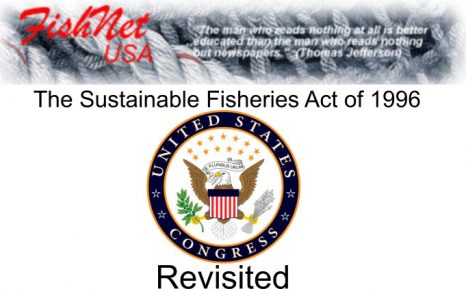
The Sustainable Fisheries Act – January 11, 2000 Revisited
I’ve been reviewing my past writings to gauge which, if any, have aged gracefully and which haven’t. I’ll be redistributing those that I think were particularly noteworthy, either because they were – and perhaps still are – on target or because they weren’t – or aren’t. The following addresses some of the more onerous provisions of the Sustainable Fisheries Act of 1996, which at the time were being fully implemented. I’ll leave it up to you to determine whether I hit this nail on the head or not. I’d be really interested to hear what you think. Nils Stolpe. From the article: Under the provisions of the federal Sustainable Fisheries Act (SFA), at any point when the populations of each of these competing species aren’t at MSY they are considered to be “overfished” and stringent harvest restrictions implementing strict rebuilding schedules (to MSY) are mandated. By requiring that all species be at their MSY, our coastal waters are expected in the SFA to support a level of overall production that is ecologically impossible, and fishermen, both recreational and commercial, are expected to reduce their catch to meet this impossible standard. Continue reading the article here 14:45
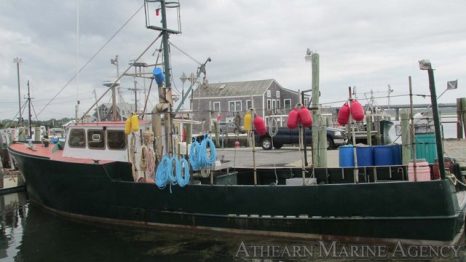
Athearn Marine Agency Boat of the Week: 55′ RI Marine Steel Offshore Lobster Boat with traps, permit
Specifications, information and 28 photo’s click here To see all the boats in this series, Click here 12:05

Revisited: Americas Finest – Floating Steel Follow the construction of a Bering Sea Fishing Trawler from start to finsh
The Big Move! This image encapsulates this monumental event for me as Americas Finest moves laterally (West) to get into a northern launch position as she points towards Alaska, her destiny. How to move 2900 tons of steel on land, stay tuned! Here she is, Americas Finest, view Weeks 82 and next week (83). See her get prepared to be moved laterally (sidetracking) to a new position that will be her final orientation before her launch. To view an incredible assortment of photo’s and review the progress, click here floatingsteel.com 10:53






 FOR IMMEDIATE RELEASE
FOR IMMEDIATE RELEASE 